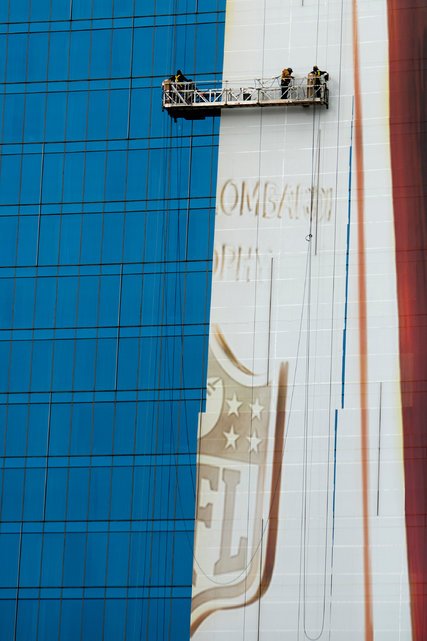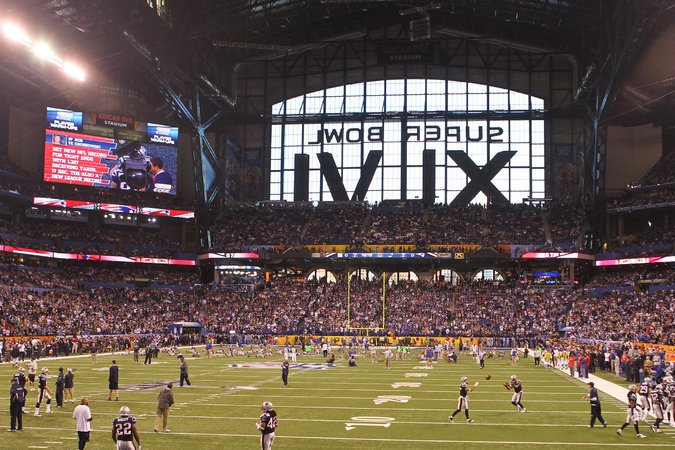“We are taking a conservative approach with the numbers,” Michael Langley, the chief executive of the Minneapolis-St. Paul economic development agency, said. “But even if you are only talking about $350 million to $400 million, that’s a huge benefit to the community, just in terms of dollars spent in February.”

Sports economists don’t view the situation quite the same way. They said the economic impact study for the Minneapolis Super Bowl began by saying all the right things about how past estimates had “been criticized as extremely overinflated, inaccurate, even purposely misrepresented.” In the end, though, it did the same thing.
“They always talk really good about that stuff, and then they go off the rails,” said Victor A. Matheson, a sports economist at the College of the Holy Cross in Worcester, Mass.
Matheson has written extensively about the effect of Super Bowls. He has found that they usually generate anywhere from $30 million to $130 million in economic activity for the host city.
“Not nothing, and not what you would sneeze at,” he said, “but somewhere between a quarter and a tenth of what is being claimed.”
Take hotel rooms, for example. To host the Super Bowl, Minneapolis had to show that there were at least 24,000 of them within 60 minutes of the stadium, capable of accommodating visitors during the entire 10-day Super Bowl celebration. Accordingly, the economic impact report estimates the Super Bowl will generate 230,000 nights of hotel stays.
But if the Super Bowl were not in town, many of those hotel rooms would have been filled anyway, by business travelers, conventiongoers and — yes, even in Minnesota in the dead of winter — tourists. It is the net occupancy gain, not gross occupancy, that matters, said Frank Stephenson, an economist at Berry College in Mount Berry, Ga.

Stephenson has studied hotel occupancy extensively, using a source of daily data that includes things like the number of rooms rented and the daily rate. This allows him to estimate how many hotel rooms in a region would usually be booked and for what price, and compare that with when the Super Bowl comes to town.
Advertisement
Continue reading the main story
In a forthcoming paper, Stephenson examines the 2012 Indianapolis Super Bowl, which generated 224,000 hotel stays, according to its economic impact report. Indianapolis serves as an apt comparison to Minneapolis since it is a cold-weather city in the Midwest. Actually, in the week leading up to the Super Bowl and the three days afterward, Indianapolis hotels rented an additional 49,000 rooms compared with what would be expected, less than a quarter of the estimate.
The rooms cost more than they otherwise would, generating about $28 million in additional revenue. But Stephenson cautioned against assuming that the money had stayed in Indianapolis; in fact, there was heavy leakage.
“They don’t give it to the housekeeper or bellboy or front-desk person,” he said. “A lot of it just flows to whoever owns the hotel.”
R. T. Rybak was the mayor of Minneapolis for 12 years, including when the City Council narrowly approved contributing $150 million to build U.S. Bank Stadium. “I hate sports economics, but I love my city,” he said, “and we ended up crafting a deal that ended up being a financial bonanza for Minneapolis.”
He explained that in addition to helping build U.S. Bank Stadium, the deal also fixed up the Target Center arena and provided funds to operate the convention center. It also spurred Wells Fargo to build two office towers near the stadium and has led to immense development in the Downtown East neighborhood, though the construction mirrors a trend seen across the country and cannot be credited simply to construction of the new stadium.
“I would not have done a deal just for the football stadium,” Rybak said, adding, “You don’t build a stadium for the Super Bowl.”
Good thing he didn’t. When cities bid to host the Super Bowl, they agree to an extensive list of specifications, which include providing goods and services worth millions of dollars to the N.F.L., all at no cost to the league. The Star Tribune of Minneapolis obtained a copy of the 153-page bid book the N.F.L. sent to prospective hosts, and the bid committee told The Star Tribune it had agreed to a majority of the conditions laid out, thought it did not specify what it had rejected.
Advertisement
Continue reading the main story
The bid book shows the host city must provide the N.F.L. with 35,000 parking spaces, thousands of hotel rooms, hundreds of buses and limousines, billboards, security, food and an exemption on paying all sales taxes, among hundreds of other specifications.
The phrase “at no cost to the N.F.L.” appears in the book 65 times.
All of these costs, at least in theory, are borne by the host committee. Minneapolis raised $30 million in pledges from the private sector before even bidding on the Super Bowl. According to Langley, of the regional economic development agency, the committee has now raised more than $50 million to put on the game. Enough is budgeted to pay for police overtime, emergency snow removal or any other cost overruns, he said.
“This is a really professional group,” Langley said.
If so, it is the rare Super Bowl host committee that has budgeted for extras. The city of Santa Clara, Calif., had its costs to host the 2016 Super Bowl reimbursed, but the game cost nearby San Francisco almost $5 million, mostly in police and transit services. Mayor Jerry Weiers of Glendale, Ariz., told ESPN that the city lost money hosting the game in both 2015 and 2008. New Jersey gave the N.F.L. an $8 million tax break, and state-owned New Jersey Transit lost $5.6 million when the game was played there in 2014.
“All of the economic stuff, if you’re lucky, is going to wash,” Matheson said. He noted there was one big noneconomic justification for hosting the Super Bowl: happiness. “We actually do get measurable impact from people’s satisfaction right after a city has hosted the Olympics, Super Bowl or World Cup,” he said.
Perhaps, but is that the windfall Minnesota imagined when it spent $498 million on U.S. Bank Stadium?
Continue reading the main story
Article source: https://www.nytimes.com/2018/01/29/sports/football/super-bowl-lii-minnesota.html?partner=rss&emc=rss
Speak Your Mind
You must be logged in to post a comment.